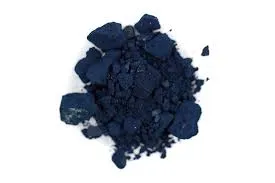High-Quality Indigo Powder Production Facility for Authentic Natural Dye Applications and Techniques
The Journey of Pure Indigo Powder From Farm to Factory
Indigo, a vibrant blue dye, has a rich history that dates back thousands of years. Today, the demand for pure indigo powder has surged, driven by the revival of traditional dyeing techniques and the growing popularity of natural dyes in textiles. The journey of pure indigo powder from farm to factory is a fascinating process that showcases the intersection of agriculture, craftsmanship, and industry.
Cultivation of Indigo Plants
The journey begins in the lush fields where indigo plants are cultivated. Indigofera tinctoria is the most common species used for producing indigo dye. These plants thrive in warm climates with well-drained soil, making parts of India, Africa, and South America ideal for cultivation. Farmers often employ sustainable practices, allowing the plants to grow naturally without synthetic fertilizers or pesticides.
Once the indigo plants reach maturity, the leaves are harvested. This is typically done by hand to ensure that the delicate foliage is not damaged. Harvesting requires skilled labor, as the timing is crucial; the leaves are collected when the indigo concentration is at its peak. After harvesting, the leaves are taken to processing facilities, where they undergo fermentation to extract the dye.
Processing and Extraction
The fermentation process is a critical step in transforming the green leaves into pure indigo powder. In a traditional method, the leaves are soaked in water and allowed to ferment in large vats for several days. This fermentation causes a chemical reaction, converting the indigo from a soluble form (known as indican) into an insoluble pigment. Once the fermentation is complete, the mixture is agitated, and the indigo precipitates out. The resulting sludge is then collected, washed, and dried.
The dried indigo is further processed into a fine powder. This stage often involves grinding the dried indigo cakes until they reach a desired consistency. The finer the powder, the better it blends with fabrics during dyeing. Quality control measures are crucial at this stage to ensure that the powder meets industry standards.
pure indigo powder factory

The Role of Modern Factories
In recent years, the demand for pure indigo powder has increased significantly, leading to the establishment of modern factories dedicated to this age-old dye. These factories blend traditional methods with modern technology, ensuring high efficiency and quality.
Factory setups are designed to streamline the processing of indigo from raw plant material to finished powder. Advanced machinery for grinding, sieving, and packaging enhances productivity while maintaining the integrity of the indigo color. Moreover, modern indigo powder factories often focus on sustainable practices, such as water recycling and waste management, aligning with the global movement towards eco-friendly production.
Market Trends and Applications
Pure indigo powder has found its way into various applications beyond traditional textiles. Artisans and designers are increasingly using it in painting, eco-printing, and crafts, celebrating its natural roots. The resurgence of interest in sustainable fashion also fuels the demand for indigo-dyed garments, as consumers increasingly seek natural and organic alternatives to synthetic dyes.
As the market for pure indigo powder continues to expand, factories are adapting their operations to meet specific customer needs. From custom color blending to bulk production, manufacturers are agile in responding to market trends.
Conclusion
The journey of pure indigo powder from farm to factory is a testament to the enduring appeal of natural dyes. It highlights the blend of tradition and innovation that characterizes the contemporary textile industry. As consumers increasingly value sustainability and authenticity, the pure indigo powder industry is poised for continued growth, bringing with it the vibrant colors and stories of the past into the future.
-
The Timeless Art of Denim Indigo Dye
NewsJul.01,2025
-
The Rise of Sulfur Dyed Denim
NewsJul.01,2025
-
The Rich Revival of the Best Indigo Dye
NewsJul.01,2025
-
The Enduring Strength of Sulphur Black
NewsJul.01,2025
-
The Ancient Art of Chinese Indigo Dye
NewsJul.01,2025
-
Industry Power of Indigo
NewsJul.01,2025
-
Black Sulfur is Leading the Next Wave
NewsJul.01,2025

Sulphur Black
1.Name: sulphur black; Sulfur Black; Sulphur Black 1;
2.Structure formula:
3.Molecule formula: C6H4N2O5
4.CAS No.: 1326-82-5
5.HS code: 32041911
6.Product specification:Appearance:black phosphorus flakes; black liquid

Bromo Indigo; Vat Bromo-Indigo; C.I.Vat Blue 5
1.Name: Bromo indigo; Vat bromo-indigo; C.I.Vat blue 5;
2.Structure formula:
3.Molecule formula: C16H6Br4N2O2
4.CAS No.: 2475-31-2
5.HS code: 3204151000 6.Major usage and instruction: Be mainly used to dye cotton fabrics.

Indigo Blue Vat Blue
1.Name: indigo blue,vat blue 1,
2.Structure formula:
3.Molecule formula: C16H10N2O2
4.. CAS No.: 482-89-3
5.Molecule weight: 262.62
6.HS code: 3204151000
7.Major usage and instruction: Be mainly used to dye cotton fabrics.

